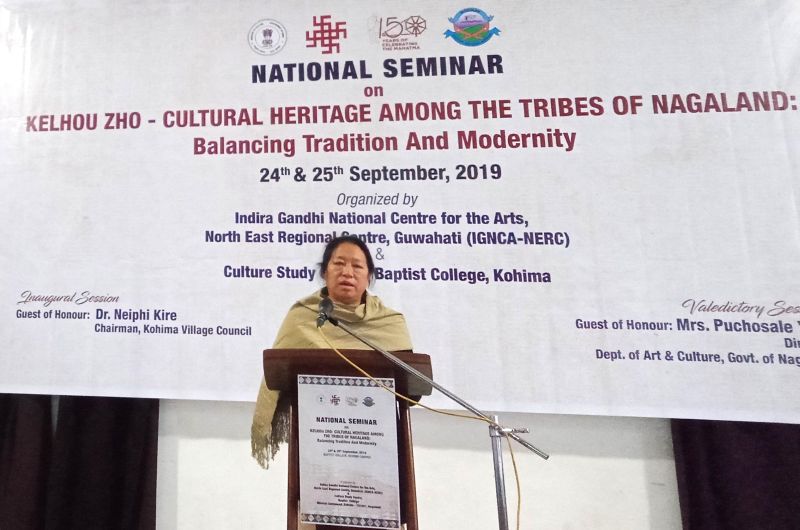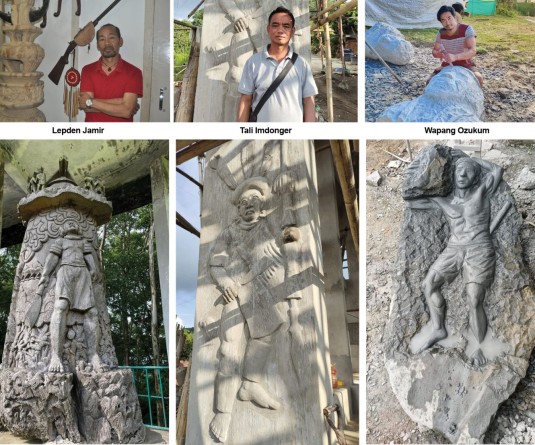2

Puchosale Yore speaking at the valedictory session of national seminar in Kohima on September 25. (Morung Photo)
National seminar on Naga cultural heritage Kohima concludes
Our Correspondent
Kohima | September 25
Nagaland’s art & culture director Puchosale Yore today said that Nagas have unique sense of hospitability and always focus for safety, security and comfort of the guests as a matter of honour and prestige.
She said this while speaking at the valedictory session of the two day long national seminar here on “Kelhou Zho- cultural heritage among the tribes of Nagaland: Balancing tradition and modernity” organized by Indira Gandhi National Centre for the Arts, North East Regional Centre, Guwahati (IGNCA-NERC) and Culture Study Centre, Baptist College Kohima
Addressing the gathering at Rivenburgs Memorial Chapel, Yore said that Nagaland is a land of diverse tribes and culture inhabited by tribes of vibrant people who deeply treasure their ancestral legacy with a strong sense of pride.
Although every tribe has their own history and culture, a number of similar characteristics have together formed the common bond of a race known as Naga, she said.
She said that though Nagaland is now a Christian dominated state, each tribe still maintain and keep their distinct identity intact, especially in the form of celebrating their different festivals.
One of the most striking features of our culture is our diversity in terms of tradition, language, attire and customary practices, she said.
She said that our oral folktales which has been passed down from generations also give an insight into the character of the Naga people.
The custom of sharing with one another is a way of life. It is a tradition to rekindle and strengthen community bonds. All this have shaped the positive character of a hospitable people who learnt to give and share without reservation, she said.
Yore said that the institution of the Morung, which in common parlance was a bachelors dormitory, served as an exclusive male club, where every male member, on attaining certain prescribed age became a member and was entitled to sleep there till one was married.
She said the Morung was in reality, an educational institution which inculcated not only general education but also offered vocational and military training.
The young pupils learnt the social values, behaviour and manners to respect parents and elders, discipline and obedience and to carry out all orders and instructions of the seniors even to the extend of foregoing comforts while attending to the needs of the seniors, the director said.
She said that Morung institution has continued despite the decline in the institution of youth dormitories.
In the face of modernity and globalization, she said the external tangible features of our traditional culture has seen some changes and seminars on our cultural heritage will benefit our present and future generation.
Also speaking at the valedictory session, IGNCA/NERC director Dr. Richa Negi said “We should preserve our culture and tradition for posterity.”
SR. Negi said that the IGNCA, NERC has been conducting research and documentation of culture and tradition through seminars in the region.
She is looking forward for publication of academic works which will become the main treasure for all of us.
Presenting the seminar report, Dr. Chiete Mero, Asst. Professor Dept. Of Sociology, BCK said that the two day national seminar witnessed 11 technical sessions and presentation of 35 academic papers.
The second day of the seminar started with three technical session with 4 parallel sessions and it was followed by panel discussion on the topic "Naga identity in contemporary society vis-à-vis social media" with Dr. Theyiesinuo Keditsu, Asst. Professor of English, Kohima College as the moderator and Dr. Visakhonu Hibo, Principal, Japfu Christian College, Tiakumzuk Aier, Director, Dreamz Unlimited and Wekoweu Tsuhah, Director, North East Network, Nagaland as the panel speakers.
In this session some of the main concerns raised and discussed encompassed issues of acquisition and derivation of identity through collective living, evolving identity, the need to relook at the very concept and idea of Naga society.
They also emphasized on the necessity to organize crash courses and video documentation about oral traditions, food, language, etc. and the need to spread such information through digital media.
The presenters also called for the need to patent the ethnic designs in clothing and also adapting it.
The film screening & discussion session was led by five resource persons, which includes Tiakumzuk Aier, Wekoweu Tsuhah, Sesino Yhoshu, Anungla Zoe Longkumer and Moba Langfhoang.
Chairing the valedictory function, Dr. Sentinaro, Asst. Prof. and Head of Dept of English, BCK stressed on the need to re-visit our culture and tradition and to document the same.
One of the participants of the seminar expressed happiness that the past two days has been very overwhelming, saying that the seminar has provided so many insights and inputs about Naga culture and tradition.
Stating that the seminar has given the participants the opportunity to learn about its own culture, she wanted to see that the seminar is not just an academic exercise “but it should be implemented in all the aspects of our life.”
Chubutse Naro, Asst. professor, Department of History, BCK proposed vote of thanks.




